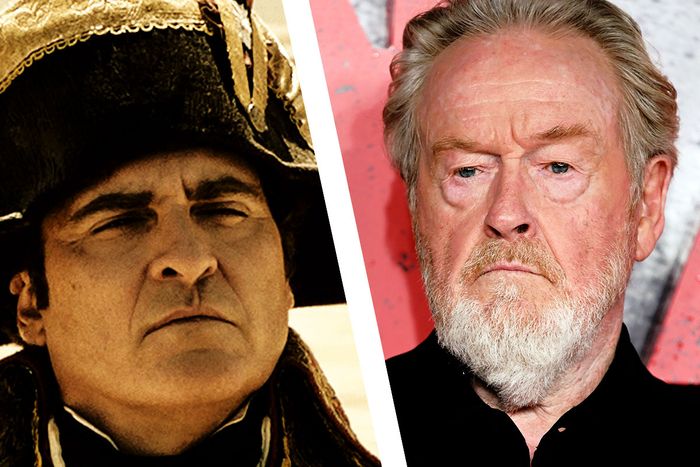
Today, November 22, Ridley Scott releases his 28th feature film since he started making movies at age 40, the two-and-a-half-hour epic, Napoleon. In the lead-up to its release in theaters (before the four-hour streaming cut comes to Apple at some unspecified date), a lot of people out there have been telling on Ridley Scott for not completely prostrating himself at the altar of historical accuracy in the service of making the movie he wants to make. And honestly? It’s like raising your hand the day before Thanksgiving to remind the teacher there’s homework. The guy lives in Provence, he named his dog Josephine, the spirit of the thing is there. Not that Scott is insecure about any of it. In fact, here’s an exhaustive timeline of everything he’s been saying about France and its history since he started his press conquest.
August 1: A very early exclusive feature in Empire (how fitting) kicked off the Napoleon press cycle and all of its j’accusations. “I compare him with Alexander the Great. Adolf Hitler. Stalin,” he says. “Listen, he’s got a lot of bad shit under his belt. At the same time, he was remarkable with his courage, and in his can-do and in his dominance. He was extraordinary.” You gotta love someone who sums up a catastrophic loss of life like he’s Ted Lasso giving a halftime pep talk.
In the feature, Phoenix straight-up says Scott isn’t interested in historical accuracy, advising, “If you want to really understand Napoleon, then you should probably do your own studying and reading. Because if you see this film, it’s this experience told through Ridley’s eyes.”
November 6: In a New Yorker profile, Scott tells a historian who made a five-minute TikTok detailing the trailer’s inaccuracies to “get a life.” We also learn Scott “wasn’t big on biographies” and gave up after reading two or three on Napoleon. But the author also observes him poring over an Oxford Napoleon scholar’s map “like a hardened general preparing for battle,” and learns he and Phoenix spent 12-hour days “psychoanalyzing the Emperor, scene by scene,” so at the very least he’s going for emotional truth.
We also learn that Scott has a love affair with France, living much of the year on a winery in Provence he bought in 1992 that once belonged to a health officer in Napoleon’s army. The cellar of which stores some Napoleonic memorabilia: “This shit is museum quality,” he said of two historic uniforms.
And the wine? “I thought all the wine should be about health, fun, sex, dogs.”
November 12: The Sunday Times reports that Scott “believes that the failed invasion of Russia in 1812 could have been different if the man in charge had not had haemorrhoids,” so we know he’s more caught up on alternate histories than anything. “It’s like having a migraine up your butt!” he says, adding, “I’ve never had them, but it’s a horseman’s dilemma.”
This is also the interview where he directly addresses a couple of the historical inaccuracies in the movie, like how Josephine was six years older than Napoleon while Vanessa Kirby is 13 years Phoenix’s junior (“I don’t think it matters”). And so what if he never fired a cannon at the pyramids? “I don’t know if he did that, but it was a fast way of saying he took Egypt.”
Scott tells the Times that “there’s a lot of imagination” in history books. “When I have issues with historians, I ask: ‘Excuse me, mate, were you there?” he questions. “No? Well, shut the fuck up then.’”
November 14: Right off the bat, Scott establishes his French bona fides in a sweeping Deadline profile. “I’ve always admired the French way of life,” he says, while recounting how he fell in love with the region the first time he visited, as a teenager, and says he continued to dive “deeper and deeper into the French history and their national awareness of who and what they are” when he had an office in Paris during his advertising years.
He doubles down on the anti-history-book thing, saying history books are inaccurate when you can just go to a historical cathedral and “get a history lesson from the painting, right there.” He apparently based a lot of the Egypt stuff in the movie on paintings from the late 19th century, including this 1886 oil painting featuring a scarily photorealistic Sphinx.
Scott knows enough to get by, though. Take the way he sums up Napoleon’s failure in Russia in 1812: “When you start the journey back to 2,000 mile on foot and you start late, you’re going to meet the Russian winter, and it will kill your ass … They were constantly hit by Russians and Cossacks who could live off the land. They’d eat a wolf, they’d eat each other.” Is that strictly true? I don’t care if Papa Ridley says it is!
Also, this non sequitur that I promise makes no more sense in context: “Do you have candles and matches at home?” he asks. “I live in France, so I do.”
November 18: In response to a French critic and Napoleon biographer calling Napoleon “very anti-French and very pro-British,” Scott tells the BBC, “The French don’t even like themselves … The audience that I showed it to in Paris, they loved it.” Vive le roi du cinéma!





